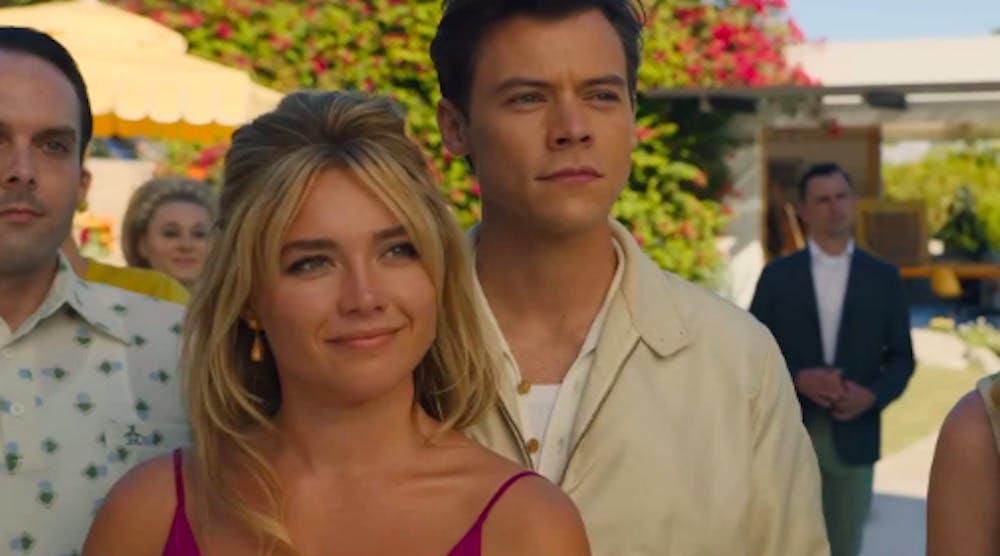By Sara Nigro
Staff Writer
Starring Oscar-nominated actress Florence Pugh and world-renowned pop star Harry Styles, “Don’t Worry Darling” took its all-star cast and fascinating storyline to theaters this weekend.
The film, which was released on Friday, Sept. 23 and was directed by Olivia Wilde, takes the idealized time period of 1950’s America and puts a twist on the reality of its setting as a supposed utopia. As a psychological thriller, it fits its genre well and much of the credit is due to lead actress Florence Pugh.
While other characters hold their weight, Pugh’s stunning performance is what picks up the slack that the other cast and crew may be lacking. Her portrayal of Alice is entertaining and authentic, and her relationships and interactions with other characters is essential in creating a coherent storyline.
The film’s overall idea is entertaining and captivating for viewers, and the acting is done well. However, the writing is sloppy at times, leaving some confusion to the audience as the credits roll.
The story begins in an utopia-like setting with picture-perfect houses, cars, and lawns — all identical, with a backdrop of sunny skies and palm trees.
One of the first scenes sets the tone for the rest of the film, displaying the everyday routine of these characters. It follows a montage style in cutting from scenes of cooking breakfast, eggs and bacon frying in a pan, cutting slices of toast, then to the husbands arriving to greet their wives and eat breakfast. The men then leave for work in their nearly identical cars, only distinguishable by color, as their wives stand in their lawns and wave goodbye.
As the movie is filmed from a woman’s point of view, Pugh’s character Alice, we as the audience don’t get to see where the men go to work, just as the women in this utopia don’t.
The audience follows the women through their day, watching them clean their house, go shopping, and swim with their friends and neighbors before returning home to cook dinner for their husbands before they return from work.
The repetitive nature of this lifestyle, the tedious mantras repeated by the leader of this place, Chris Pine’s character Frank, and this “picture-perfect” world is set up nicely for the audience to feel a sense of uneasiness to come.
The distress sets in and is felt through the character of Alice as she starts to notice abnormalities in her life that seem to be an individual experience. She starts to spiral and is made to feel crazy by the supporting characters in her life.
The rest of the film follows the depth of her spiral as truths about every aspect of her life are revealed and the basis of this utopia is unraveled.
Pugh gives an outstanding performance, rivaling her previous roles in acclaimed films such as “Midsommar” and “Little Women.” Styles, new on the acting scene, is unable to match Pugh’s skills but still gives an overall decent performance through his charm and comedic timing.
The comedic elements from Styles' character Jack and Wilde’s character Bunny added a lightness that was needed as the darker themes developed through the plot's progression. This is demonstrated from impromptu songs in the kitchen to tap dances and off hand comments while shopping.
The score to this film is incredibly important in portraying the emotions of the characters, specifically Pugh. In addition to the background music, while Pugh’s character cooks breakfast and mingles with her friends and neighbors, a specific song plays an integral role in furthering the plot of the film.
“With You All the Time,” a song created for the film, is the first glimpse of her past life that Alice is able to identify. She begins by humming the tune, unsure what it is, and then later the audience learns where she remembers it from, at the same time that Pugh’s character does.
The song is a constant for Pugh’s character, as well as for the audience, in enforcing the uneasiness of Alice's situation as the film progresses.
Based on the wardrobe and hairstyles alone, viewers understand that the time period is meant to replicate 1950’s America. The men all wear neatly pressed suits and the women wear long dresses, often in floral prints.
Taking on the ideal life of the picture perfect American Dream, Wilde portrays this simulation as a “dream world,” a world where women should be grateful that they get the opportunity to be homemakers rather than have a job in the “real world.”
As the female protagonist, Alice rebels against this idea, as do other women while the film draws to a close. For example, Frank’s wife Shelley, portrayed by Gemma Chan, rebels in a major way during the remaining few minutes. In the action-packed final scene, Shelley completely opposes her previous characteristics and betrays a loved one.
While I appreciate Wilde’s goals in creating strong, female characters, I think in some instances, such as Chan’s rebellion, she fell short. The lack of character development leading to this moment allows it to come across nearly ineffective and leave the audience confused.
The overall idea for the film is fascinating. While Pugh’s acting is incredible, there was something unsatisfying about the ending. There were some plot holes that never seemed resolved, and the overall pacing of the film seemed uneven.
The third act was rushed, revealing too quickly all of the secrets that the film had been building up to in the first two acts. Ideally, the major questions regarding the reality of the world that the characters are living in would be addressed earlier on to improve the overall pacing.
The ending of the film is entertaining and action packed, but also intense enough to give the audience whiplash. While the ending seems logical, as the credits roll the questions start to unfold as to what exactly happened, as well as what is to come for the characters.
“Don’t Worry Darling” is now available to watch in theaters.







